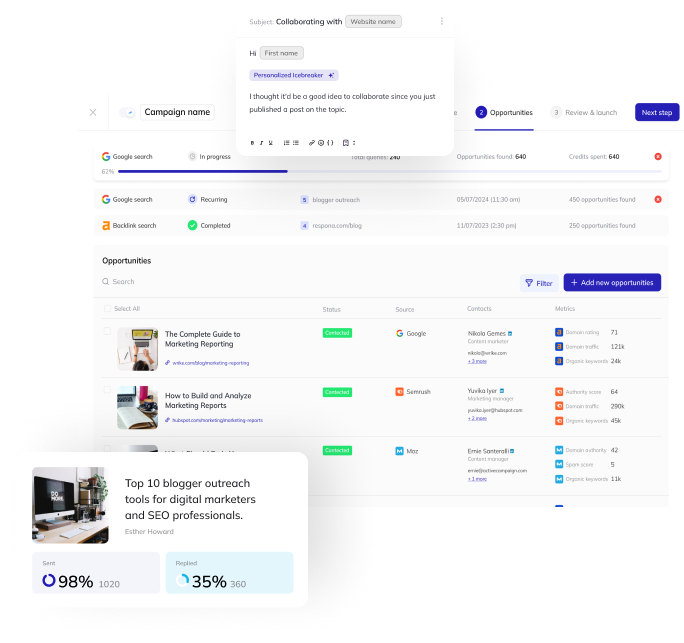What’s the best way to promote your new podcast in 2024?
In this guide on podcast marketing, we give you all the best practices and examples you’ll need.
Inside, you’ll find…
- Examples from successful podcasters—some of whom you may know already,
- Best practices for effectively marketing your podcast,
- A step-by-step strategy to promote your podcast.
If you want to find out more about podcast marketing without using a promotion service, you’re going to need this guide.
Let’s get into it.
- What is Podcast Marketing and Why is it Important?
- Tip #1: Your Guests are Your Best Promoters
- Tip #2: Build an Audience First
- Tip #3: Get Your Listeners Involved (Ask For Opinions and Questions)
- Tip #4: Be a Guest on Other Podcasts
- Tip #5: Be Consistent With Your Schedule
- Tip #6: Try to Promote Your Podcasts Using Other Channels
- Tip #7: Your Content Needs to Be Timely and Relevant
- Tip #8: Do Conversations, Not Broadcasts
- Tip #9: Promote Your Podcast on Social Media
- Tip #10: Do Regular Giveaways
- Podcast Marketing Strategy: How to Get Interviewed on Other Podcasts
- Wrapping Up
Link building cheat sheet
What is Podcast Marketing and Why is it Important?
First things first, let’s start by defining what a podcast is.
According to a concise definition by Wikipedia:

In other words, a podcast is an audio program, a series of audio alongside talks that examine a specific topic.
The topic or theme of a podcast can be as varied as the podcaster wants it to be.
The same applies to the way the podcaster is going to approach the topic as well as whether it’s going to be an interactive, a conversational series of podcast episodes, and so on and so forth.
Those who want to listen to a podcast become subscribers by subscribing to the podcast using an app on their smartphones.
Author’s Note: The most popular podcast apps are available on both iOS and Android.
The term podcast marketing refers to the strategies a podcaster employs in order to advertize and raise awareness of their podcast.
Put another way, podcast promotion can help enhance discoverability as well as increase a podcast’s reach and the number of potential listeners.
When it comes to podcast marketing, it’s important to keep in mind that it’s basically like any other marketing activity where you use marketing tactics in order to make sure that your hard work won’t go unnoticed.
The same way you might use Facebook ads or Facebook groups as part of your content marketing strategy in order to promote and distribute your content, you’ll use podcast marketing to promote your podcast content.
As simple as that.
Let’s dive deeper into how to promote a podcast with our first tip.
Tip #1: Your Guests are Your Best Promoters
The first tip we have for you is to think of your podcast guests as your best promoters.
Our first tip refers to the case where a podcast host invites well-known guests on their show in order to increase the number of podcast subscribers and raise awareness about the show.
To make a popular podcast, it makes absolute sense to bring on popular people that already have their own audience.
Why?
By inviting people that have a wide reach, you make it easier for a large number of people to know about your podcast and, most probably, give it a try.
A podcaster might invite influencers, celebrities, or industry experts to be guests on their podcast.
This allows a podcast to be heard by more and more people, given that the guests will most probably promote their participation to their audience.
Let’s see an example of this.
Example: The GaryVee Audio Experience
Gary Vaynerchuk, entrepreneur, investor, and vlogger, is an example of an extremely popular podcast.
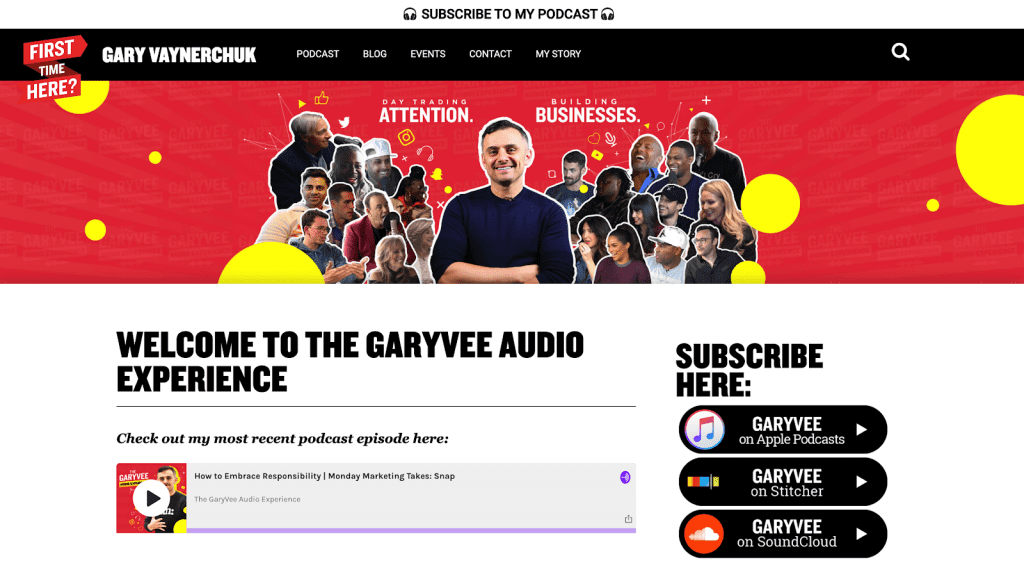
His podcast can be found in many podcast apps and various channels, including Apple Podcasts, Spotify, Google Podcasts, Stitcher, and his own podcast website which is shown above.
Very often, Garry’s guests and interviewees are famous people who have a big reach and word of mouth will work perfectly when they’re involved.
Here’s an example:

Now, you might wonder how Gary Vee is relevant to LL Cool J.
That’s the thing — Gary Vaynerchuck understands the importance of expanding your audience through the audience of other, well-known people.
Simply put, popular people help spread awareness on the podcast, regardless of whether they’re tightly relevant to your audience.
Of course, the more relevant, the better.
In the event that’s not possible, you should focus on getting as much exposure as possible out of every episode.
Inviting people who already have an audience is a great way to do that.
Moving on to our second tip.
Tip #2: Build an Audience First
The second tip in our guide of promoting your podcast is to make sure that you have an audience that you can build on in terms of adding up to it and bringing in a new audience.
In other words, before you move onto using potentially effective marketing strategies to promote your podcast, try to make sure that your podcast already has some loyal podcast listeners.
However, when we say ‘build an audience first’, we don’t necessarily mean for or through your podcast.
We’re talking about building an audience in general (e.g. through your website) and then doing a podcast as another effective and interesting way to engage with that audience.
The reason for that is simple.
It’ll be easier to expand your target audience when you already have a good number of loyal followers.
The example that follows will help make this more clear.
Example: The Tim Ferriss Show
Tim Ferris, known author, entrepreneur, and investor is a podcast producer for one of the most popular podcasts out there.
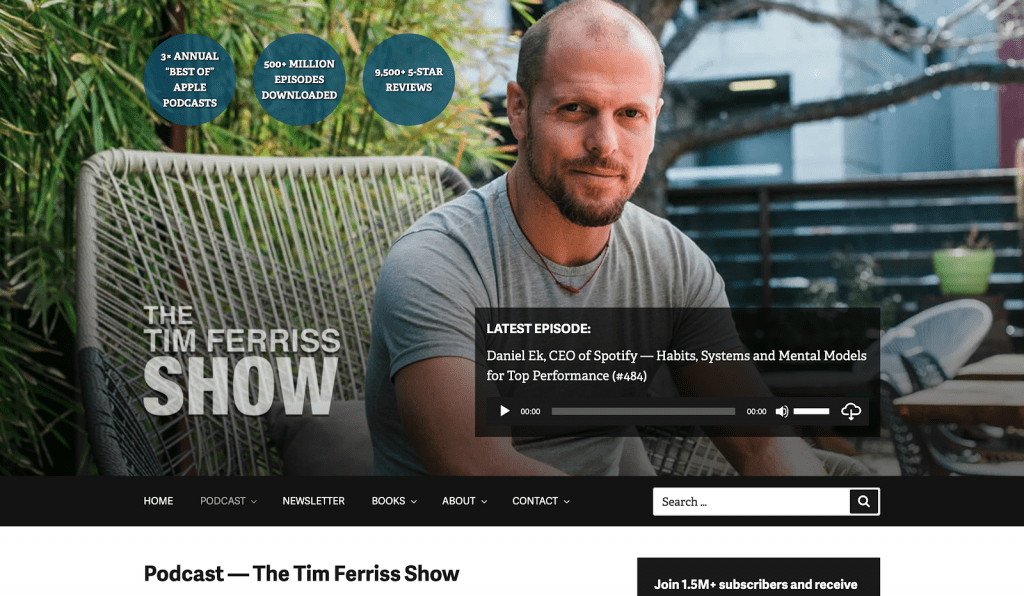
Similar to the podcast we discussed a little further up, Ferriss’s podcast can be found in lots of different podcast platforms, like Overcast, Apple Podcasts on iTunes, RSS feed, and so on and so forth.
The reason we’re using Tim’s podcast as an example is because the audience he has gained from one of his best selling books, The 4-Hour Work Week, alongside his Youtube videos, have successfully helped build an audience around his podcast.
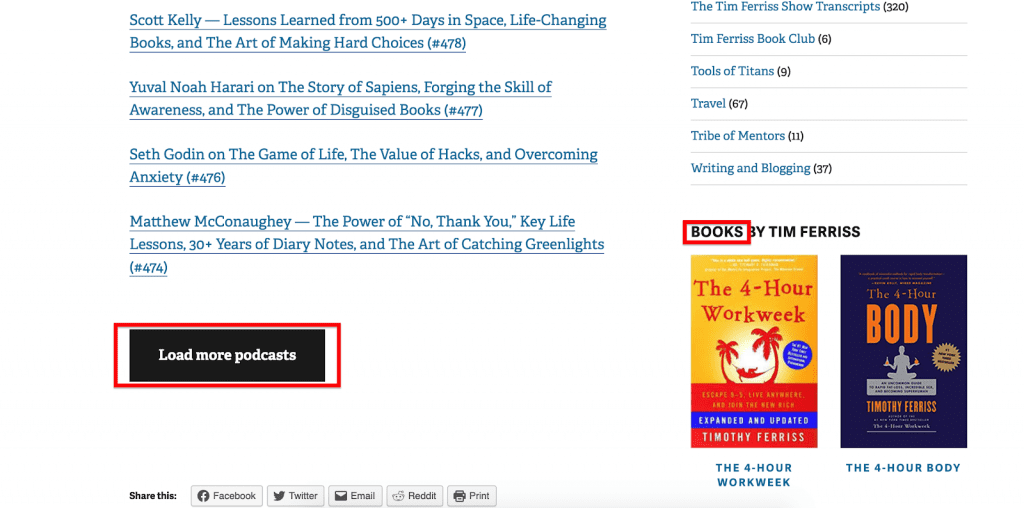
Having an audience from your writing, your Youtube channel, your blog, or through your social media accounts, makes it more likely that your podcast will get a bigger reach.
Moving on to the third tip we have for you.
Tip #3: Get Your Listeners Involved (Ask For Opinions and Questions)
The third tip we have for you is to get your podcast listeners involved by asking for their opinions and encouraging them to ask questions that you’ll use in your episodes.
In other words, work to build a podcast that’s interactive and promotes audience participation.
Getting your listeners actively involved is a great way to make them engaged with your content.
Also, audience involvement is a great way of giving back to your audience and showing that, without them, your content would have been different, thus making them feel that they’re included in the process of making the podcast; that their participation matters.
You can get listeners involved by asking them questions and reading their answers using your social media channels.
Alternatively, you could also ask your listeners for questions they’d like to ask some of your upcoming guests and make sure you do your best to include audience questions when your guests come.
This’ll make your audience look forward to your future episodes.
The example we’re using here has taken interaction to a whole new level.
Example: 3D Escape Room: Frequency
Written and produced by Michel Lafrance, the 3D Escape Room: Frequency is an interactive podcast.
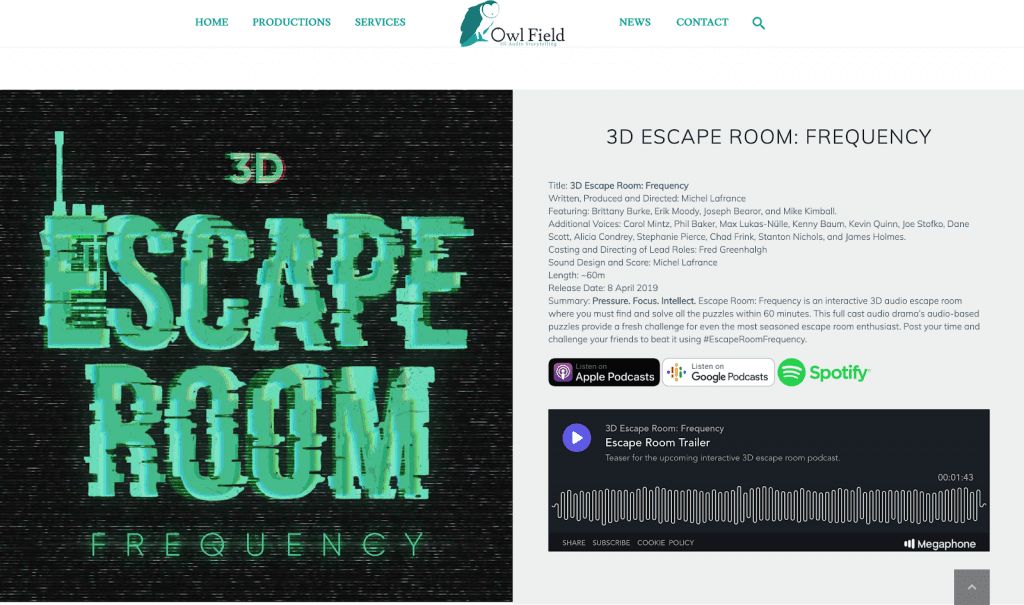
How much interaction is involved?
Well, the podcast is basically a 3D audio escape room where listeners need to actually take action and solve puzzles within an hour.
We understand that not all podcasts are going to be that interactive but we wanted to show you this so you get an idea of how much potential there is in a podcast and subsequently to podcast marketing and the engagement tactics a podcaster might want to employ.
Let’s move on to our next podcast marketing tip.
Tip #4: Be a Guest on Other Podcasts
The fourth tip we have for you in terms of promoting your podcast is to be a guest on other podcasts.
This won’t only help you make connections, it’ll also help you expand your podcast network by making your own podcast known to a different audience that listens to other podcasts already.
Author’s Note: We’ll be sharing a step by step process on how to be a podcast guest a little further down in this post.
Podcasting is about creating killer content and bringing more and more listeners to it.
Simply put, participating in other popular podcasts can help you bring awareness to your own podcast.
Our example here will help illustrate our point.
Example: The SaaS Marketing Show
Co-founder and CEO of Hey Digital, Dylan Hey, hosts The SaaS Marketing Show, which provides the audience with valuable content on SaaS marketing and growth.
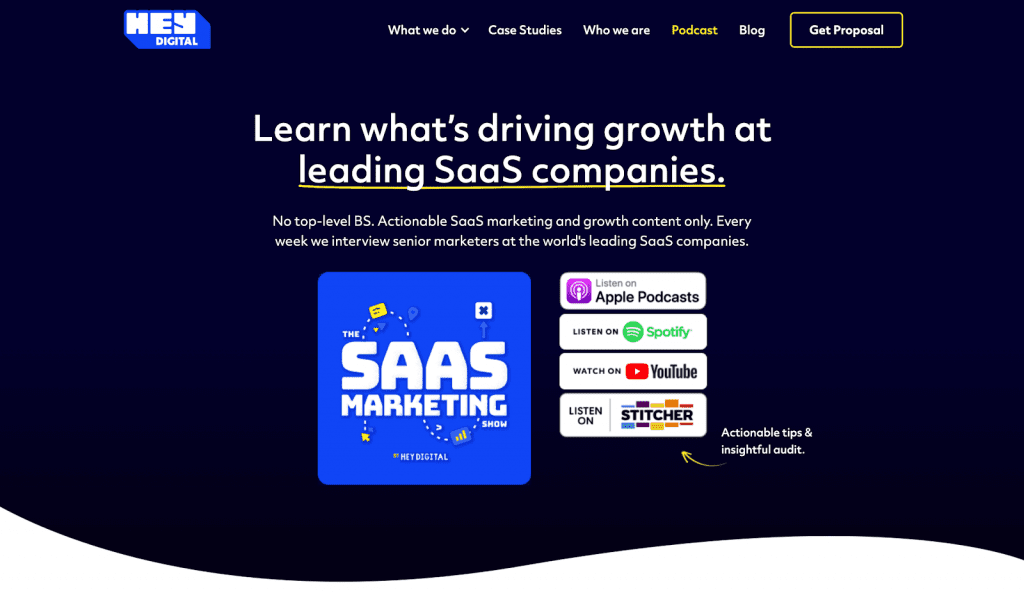
We’re talking about Dylan here because he’s a great example of a podcast producer that participates in other podcasts as well.
Here’s an example of this:
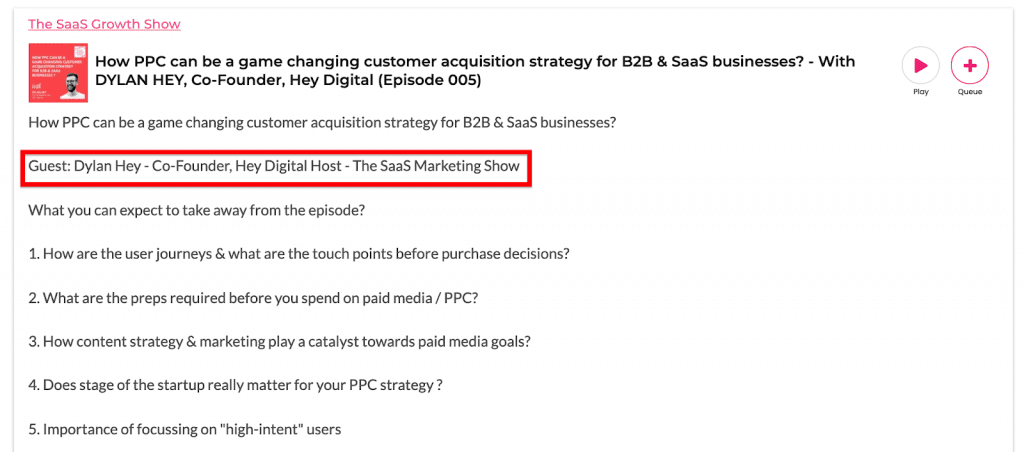
And here’s one more:
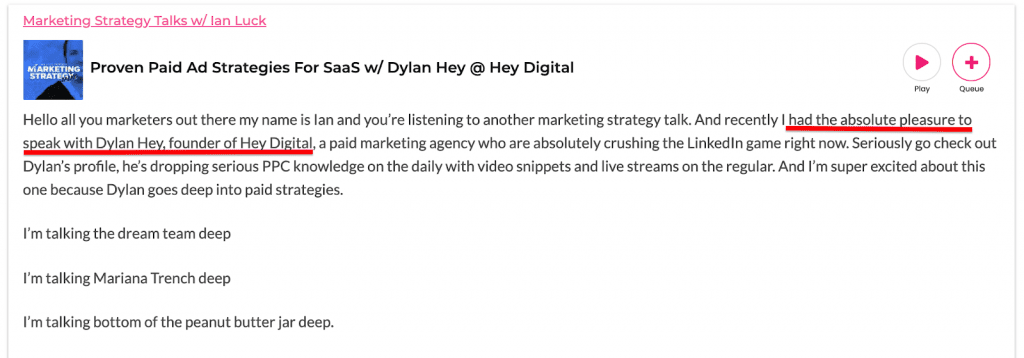
Being a podcaster and going to other podcasts as a guest means that you’re always in a good position to expand your audience and get more and more people to know you and your work, including your podcast.
Keep reading to find our fifth podcast marketing tip.
Tip #5: Be Consistent With Your Schedule
The fifth tip we have for you is to be consistent with your schedule in terms of how often and when you release new episodes.
To be consistent with your schedule means that you’re planning your podcast schedule and posting episodes on specific days of the week..
This allows your audience to know when to expect you to release new episodes.
Being consistent with your schedule makes it more likely that your audience will be loyal to your content and won’t miss out on new content because they didn’t know it was out.
We don’t expect someone to have a consistent schedule from the very first episode they release, but it’s important to gradually establish a schedule that’ll make it easier for your subscribers to follow you.
Our example here comes from Neil Patel and Eric Siu.
Example: The Marketing School
When it comes to consistency in terms of releasing a podcast episode, The Marketing School, with popular marketers Neil Patel and Eric Siu, is the top podcast example we need to speak of when speaking of consistency.
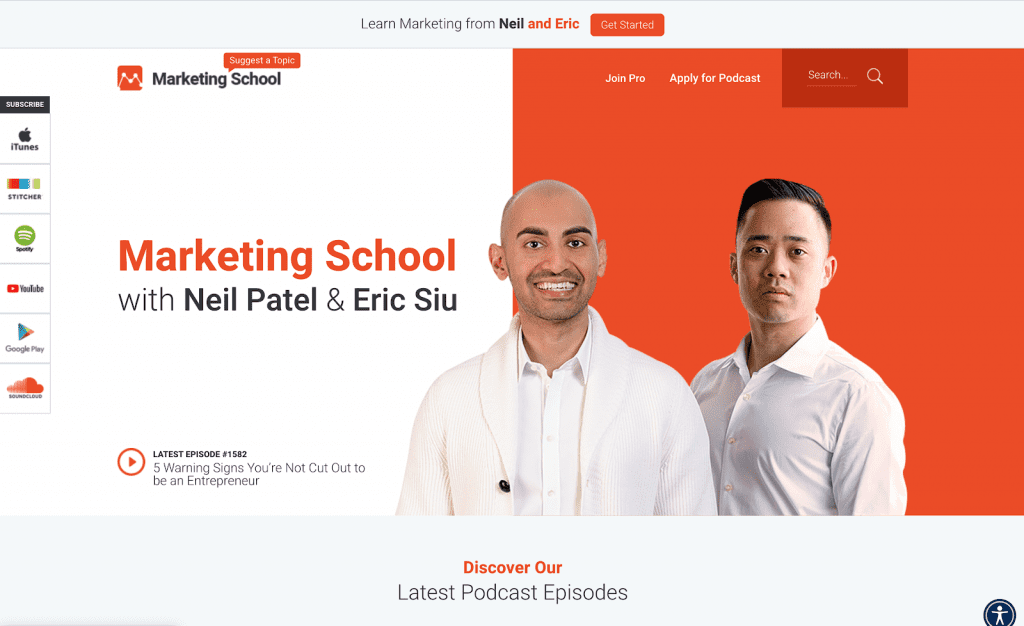
What these guys are doing is that they’re releasing a podcast episode every single day.
Have a look at the release dates below:
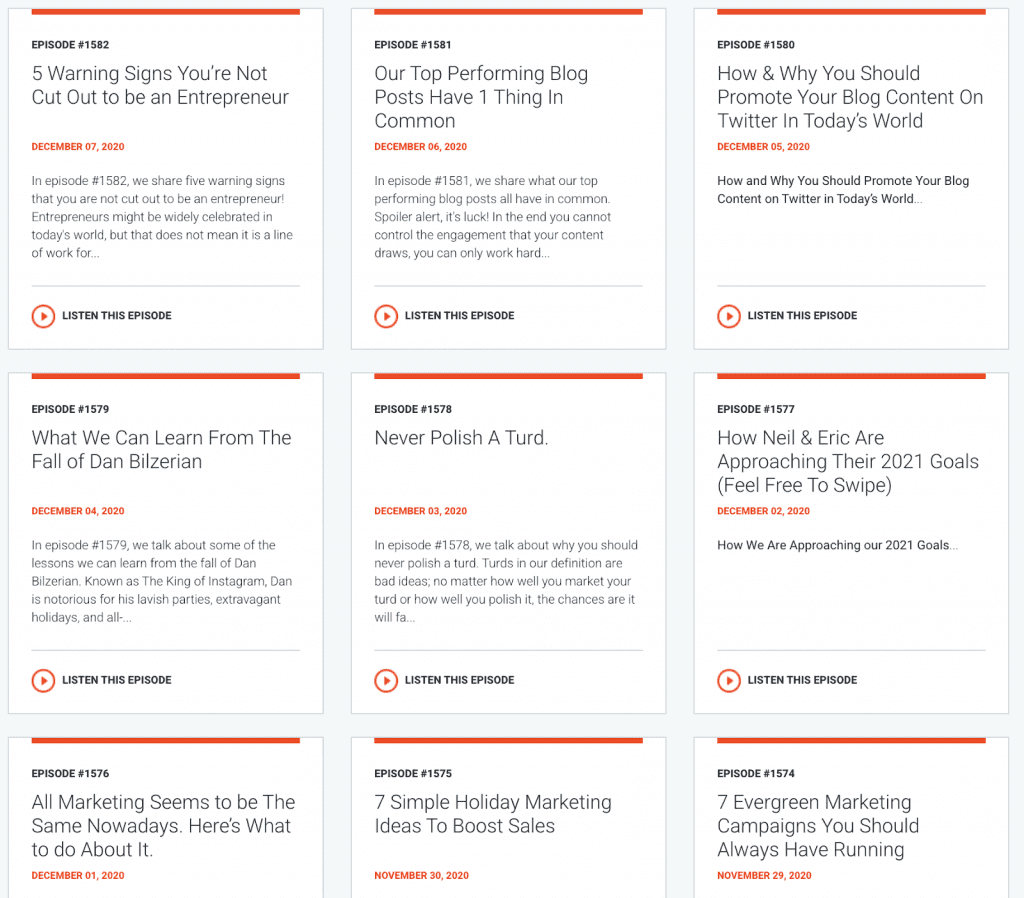
To be able to release a new episode every single day, Neil and Eric also use the power of interaction with their audience -which we discussed a little further up in this post – by asking them to suggest topics for upcoming episodes.
Impressive, isn’t it?
Moving on.
Tip #6: Try to Promote Your Podcasts Using Other Channels
Another thing we believe is important is to try to promote your podcast via your other channels.
Using other channels basically means that you’re taking advantage of any platform that’s available out there and can be used to spread the word about your podcast.
It might be your blog, your social media account, your email list – so you might want to bring on some email marketing magic in there too! – and even a dedicated landing page you’re using to drive traffic to through social ads.
Author’s Note: For creating a dedicated landing page for your podcast, you can either use your CMS, e.g. WordPress, or a tool like Unbounce.
Additionally, some other channels could be digital marketing, Google Adwords, Facebook Ads, as well as search engine optimization (SEO).
As we did previously, we’re looking at an example that’ll help us make this tip more clear.
We’re going to discuss the following example:
Example: Content and Conversation
Made by the team at Siege Media, the Content and Conversation podcast is made mostly for content marketers.
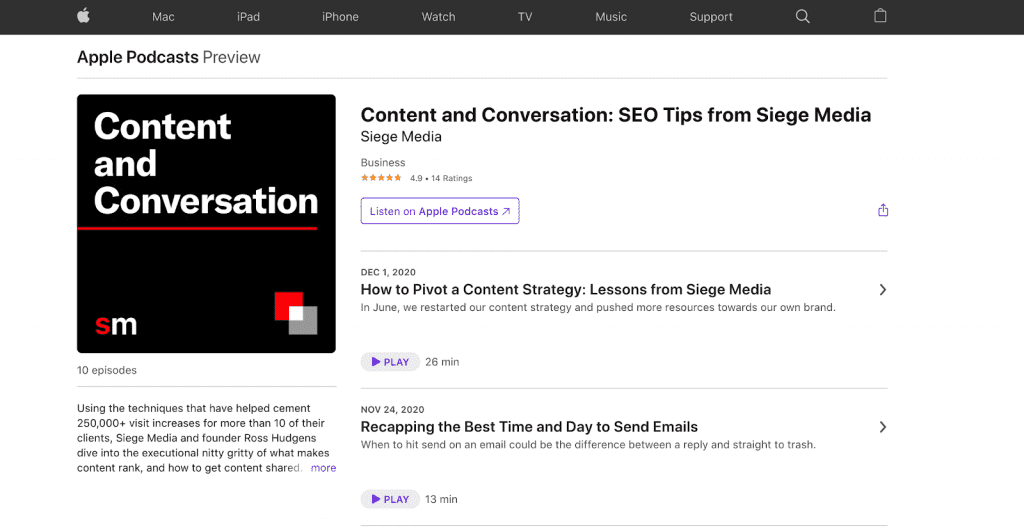
This is a great example of a podcast that’s using the power of other channels to promote their podcast.
In this case, Siege Media is using their blog to spread the word about their new podcast episodes.
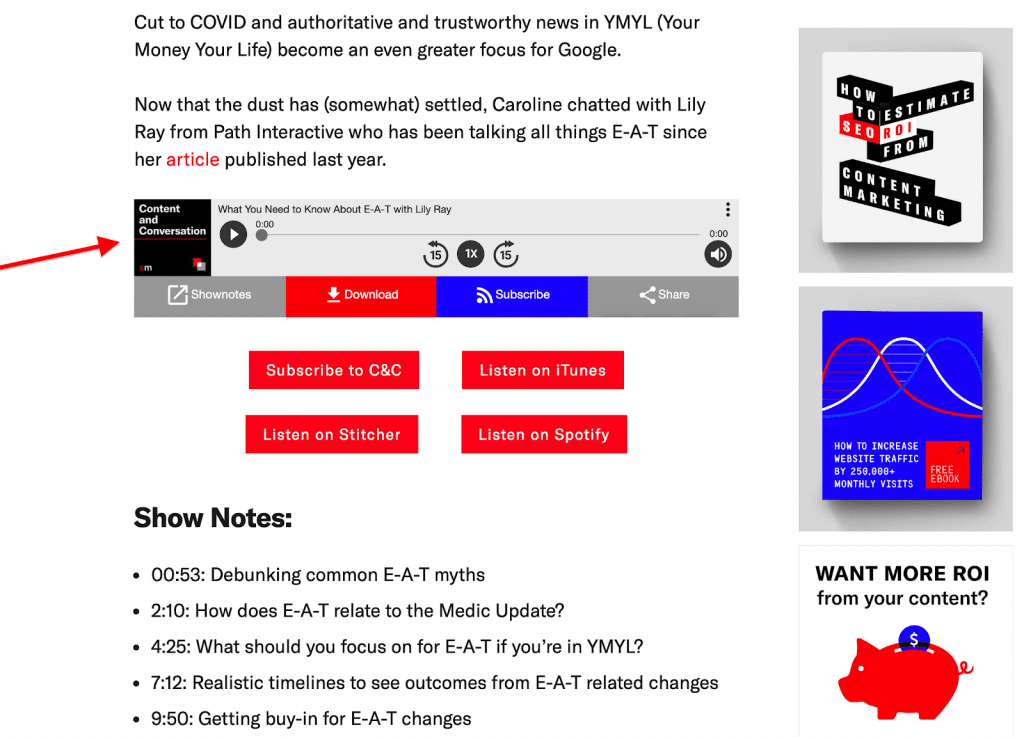
This way, they’re making their podcast known to their blog readers by sharing both the episode itself as well as some show notes in the form of a bullet pointed list.
The notes can potentially make someone who mightn’t have listened to the podcast episode before to get an idea of the podcast’s content and subscribe to it.
Repurposing your podcast and making it a blog post, a Quora or Reddit post, etc., can help bring more awareness to it.
Just make sure to stick with the content formats you feel most comfortable with and repurpose your podcast episodes so that people can consume your content in other ways.
Tip #7: Your Content Needs to Be Timely and Relevant
Our seventh tip is that your content needs to be timely and relevant.
Podcasters should always try to identify trends and opportunities in what’s going on in the world or in the industry they’re working in.
Doing that gives you the advantage of talking about things that people are currently interested in.
Additionally, podcasts that discuss topics that are of interest to many people in a specific period of time get lots of chances of attracting new listeners as well as keep their existing subscribers engaged.
Let’s look at an example.
Example: Entrepreneurs on Fire
The Entrepreneurs on Fire podcast with John Lee Dumas shares valuable and inspiring content for entrepreneurs.
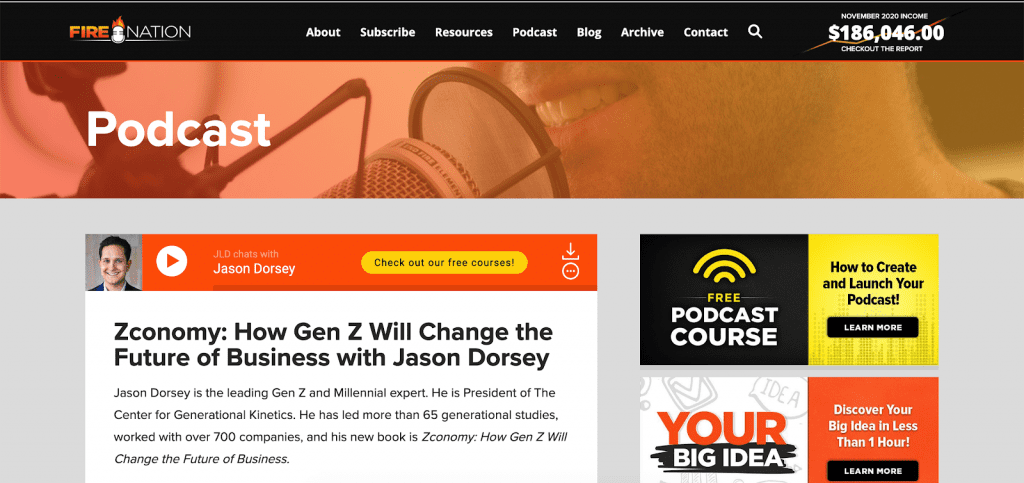
More specifically, we’re looking at an episode they did with LearnWorlds CEO Panos Siozos.
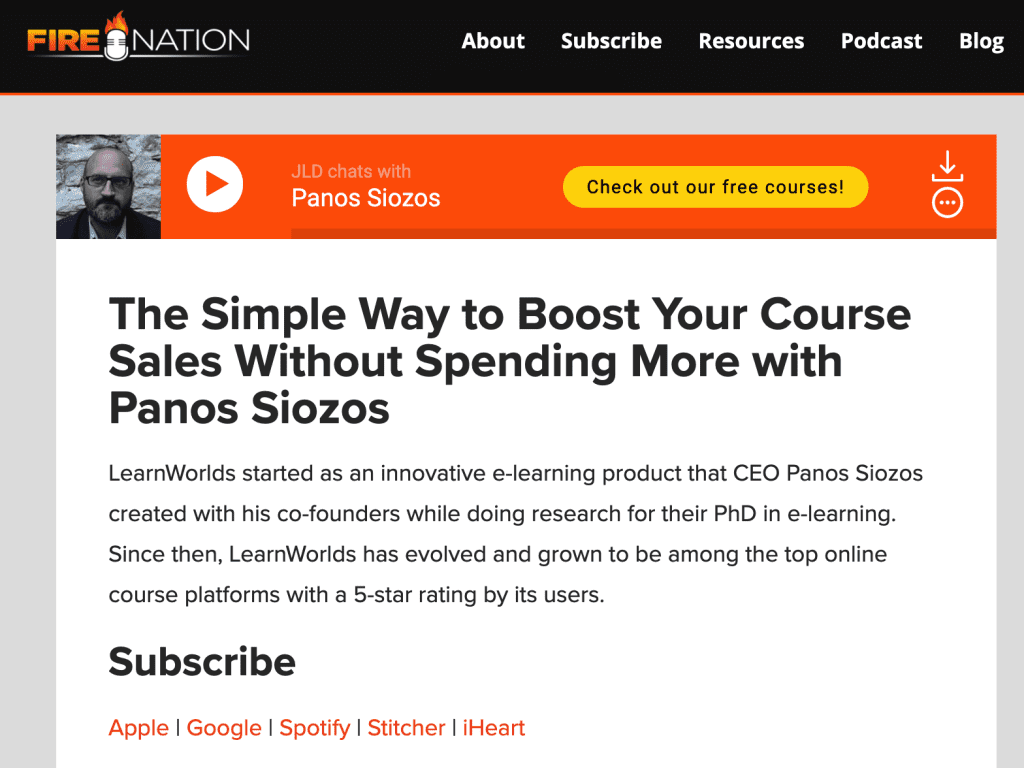
Given that LearnWorlds is an eLearning platform, it makes sense that the episode was posted right in the middle of the COVID-19 outbreak, when the interest for eLearning spiked.
Because of the fact that the whole world had to deal with an unprecedented situation, the Entrepreneurs on Fire podcast gave their audience a really interesting and ‘hot’ topic to learn more about.
The right timing helps in terms of podcast promotion because of the topics’ relevance to what people are currently dealing with and subsequently want to know more about.
Let’s now move on to the next tip we want to share with you.
Tip #8: Do Conversations, Not Broadcasts
Another tip we think it’s important to share is to do conversations, not broadcasts.
In other words, employ the power of conversation and exchanging opinions between people instead of choosing to give monologues to your audience.
Broadcast might sound too cold and distant and the chances are that your audience won’t continue listening to your podcast if they don’t feel involved in the process of making it or if they don’t feel that they’re participating in the way the content is formed.
Conversations usually have an impactful and engaging flow that keeps listeners engaged and makes them want to know more about the topic each episode examines.
We’re looking at Joe Rogan’s podcast as an example.
Example: The Joe Rogan Experience
Joe Rogan is a widely known stand-up comedian, UFC commentator, and the host of the Joe Rogan Experience podcast.
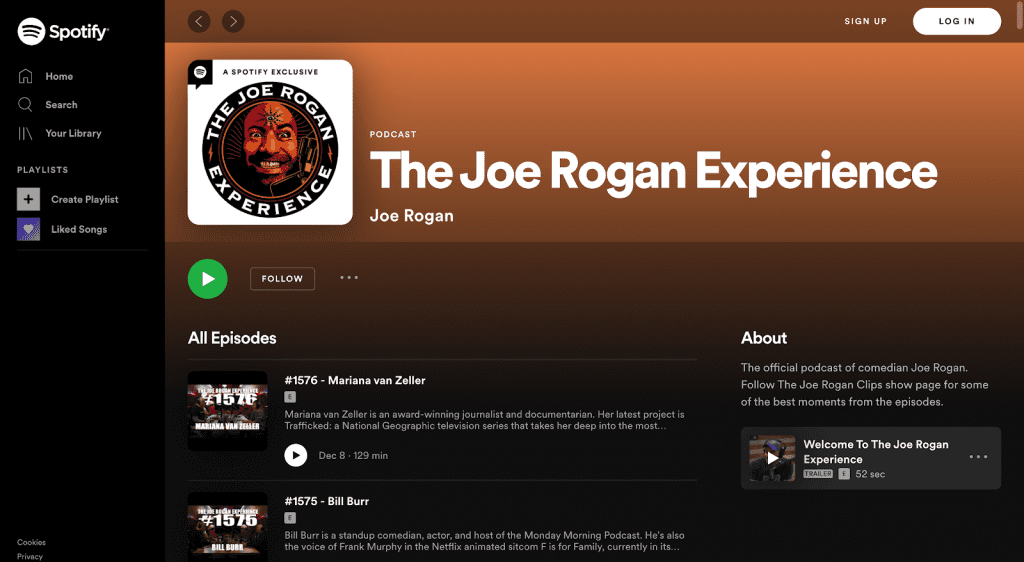
Joe was one of the first people to introduce long-form conversations in podcast form.
The podcast features conversations with celebrities as well as everyday people.
The impact of the podcast and its popularity proves how impactful and effective conversations in podcasts can be.
Generally speaking, if your podcast sounds more like a radio broadcast than a lively conversation between interesting people you might want to optimize your approach and make it easier for listeners to relate with you and your guest.
Let’s move on to our ninth tip.
Tip #9: Promote Your Podcast on Social Media
Similar to what we discussed a little further up about trying to promote your podcast via other channels, here we’re focusing on promoting your podcast on social media.
No matter how big is the number of followers you have on your social media accounts, you most likely already have an audience and you should be using it to make your podcast more popular.
Think of your social media platforms as additional places where your podcast could be heard and seen.
Thus, you should make sure to post your podcast episodes on your Twitter, Linkedin, Facebook, or any other platform you find to be working for this.
We think that promoting your podcast on social media helps you get your work noticed but also supports you in creating a consistent, online presence that keeps your audience in touch with you and your content. Make sure you use the correct social media image sizes to fit the content well in your post.
We’re using an example to show you how others are doing it.
Example: Maximize your Social Influence
Maximize your Social Influence with Neal Schaffer is a podcast on social media marketing.
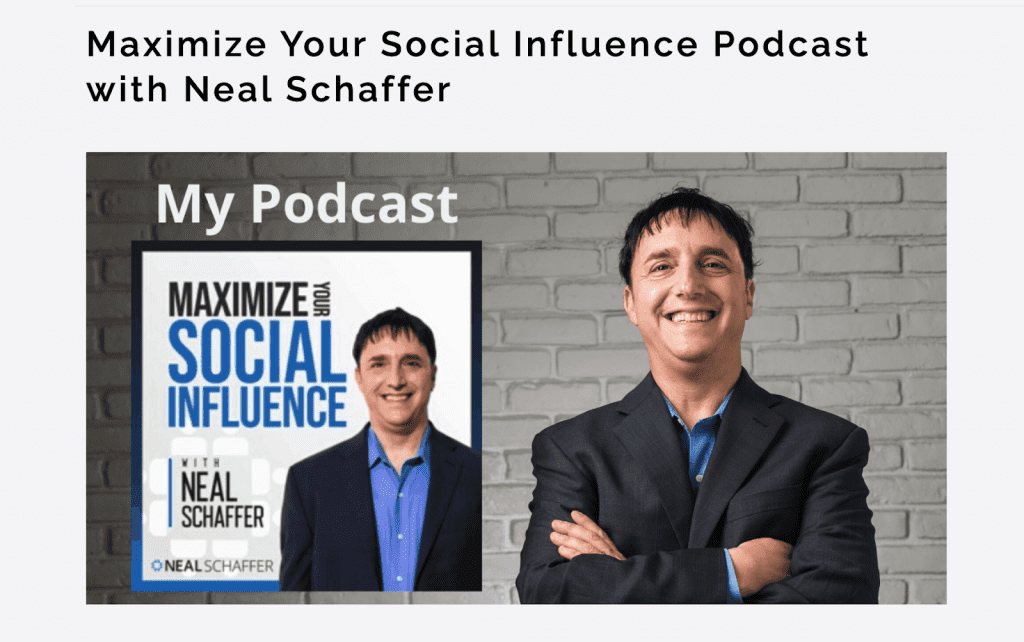
Neal obviously knows how effective social media marketing can be and he’s using his accounts to promote his podcast episodes.
Here’s one of his tweets promoting one of the episodes:
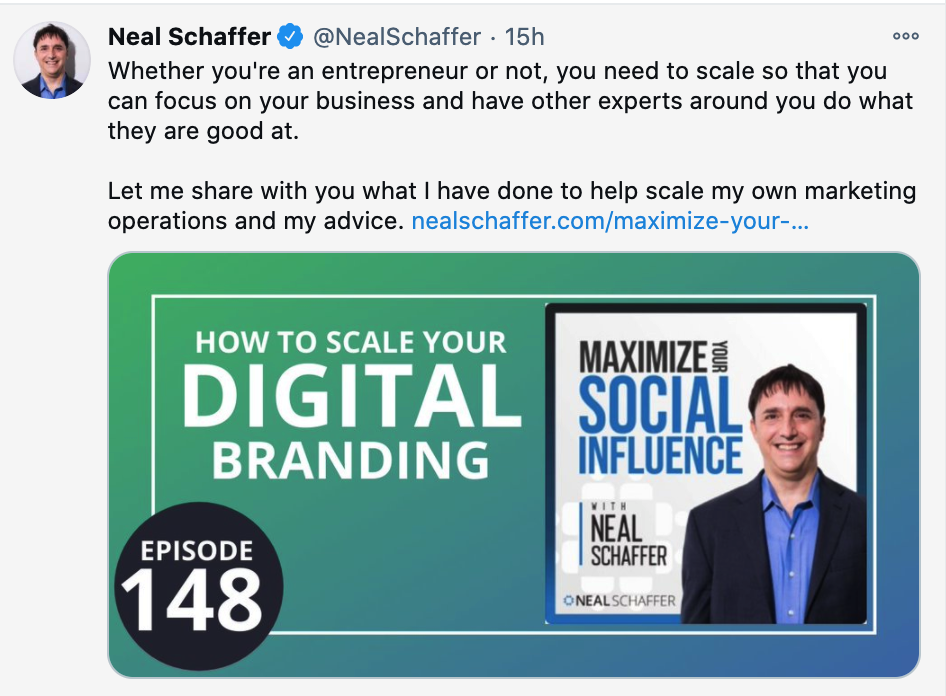
And another one:
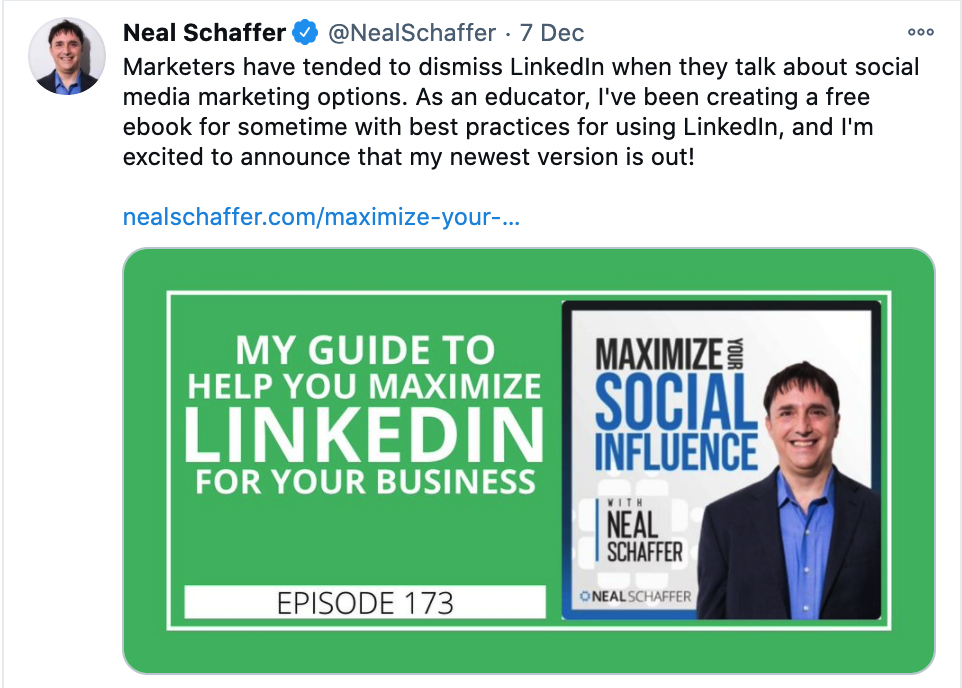
You should definitely use your social media accounts to promote your podcast.
Moving on to our last tip.
Tip #10: Do Regular Giveaways
Our last tip in terms of podcast marketing is to do regular giveaways.
First of all, giveaways are a great way to give back to your listeners and express your gratitude and appreciation for their support.
Moreover, contests and giveaways are fantastic ways to draw attention to your podcast and possibly even make it go viral if the giveaway is very good.
We’re using a lesser known podcast as an example for promoting a podcast through a giveaway.
Example: Healthy Hustle
Healthy Hustle is a fitness podcast by health and wellness business coach Rachel Feldman.
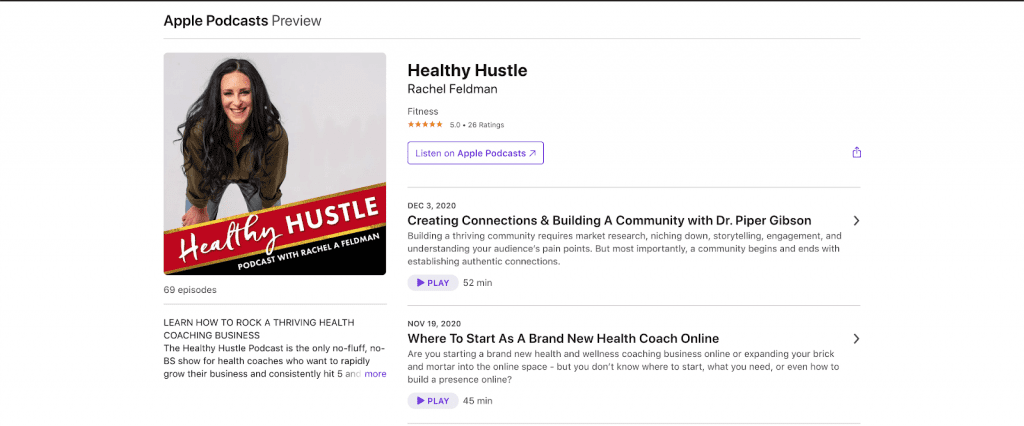
Back in the summer of 2019, when Rachel launched her podcast, she organized a huge $1.5K giveaway to kick things off.
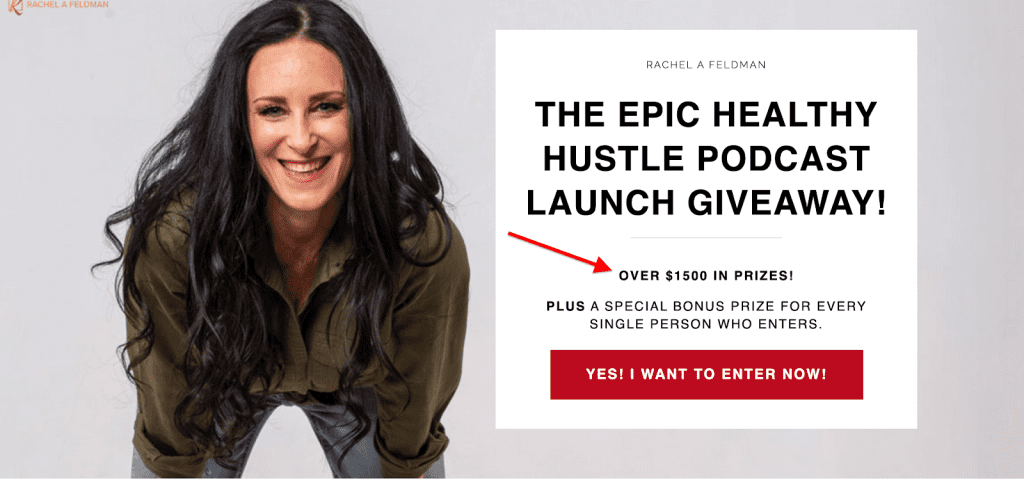
This was a nice boost and helped her raise awareness about her podcast right away.
Now, imagine if you’re doing this on a consistent basis.
The best part?
After building an audience of loyal listeners, you can get sponsors for your podcast and have them pay the cost of your giveaways.
Depending on the topic of your podcast as well as how big your podcast audience is, you can consider giving away different kinds of prizes.
After having discussed some tips you could follow to promote your podcast effectively, we’re going to talk about a podcast marketing strategy that’ll help you get interviewed on other podcasts and increase your reach.
Podcast Marketing Strategy: How to Get Interviewed on Other Podcasts
In this part of our guide, we’re using the scenario that you’re the host of a content marketing podcast and you want to spread the word about your podcast.
How?
By becoming a guest on other podcasts that talk about content marketing.
Based on this scenario, we’re taking you through the process of using Respona in order to reach out to other podcasters to get interviewed by them.
Let’s get started!
Step #1: Make a list of podcasts you can reach out to
The first step is to make a list of podcasters you can reach out to. Real quick, here’s an example of the 21 best marketing podcasts to help you with the list creation ;).
To do so, you first need to create a new campaign with Respona.
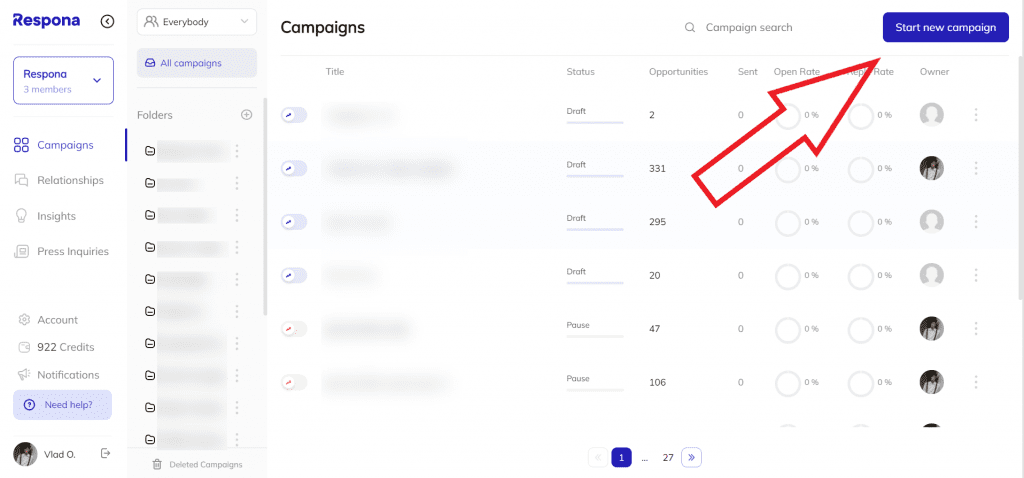
After having created a new campaign, you go to name your campaign and click on the highlighted ‘Continue’ button.

Author’s Note: It’s important that you name your campaign using a name that all people within your organization or any possible vendors you’re working with will understand.
When using Respona, you can create a campaign by choosing one of the following two options:
You either import a list of prospects, in this case of podcasts, you might have in your CSV file or you search for podcasts and podcasters using the tool’s search engine.
Since we’re looking for podcasts around “content marketing”, it makes sense that we’ll be using a term like “content marketing” for our search:
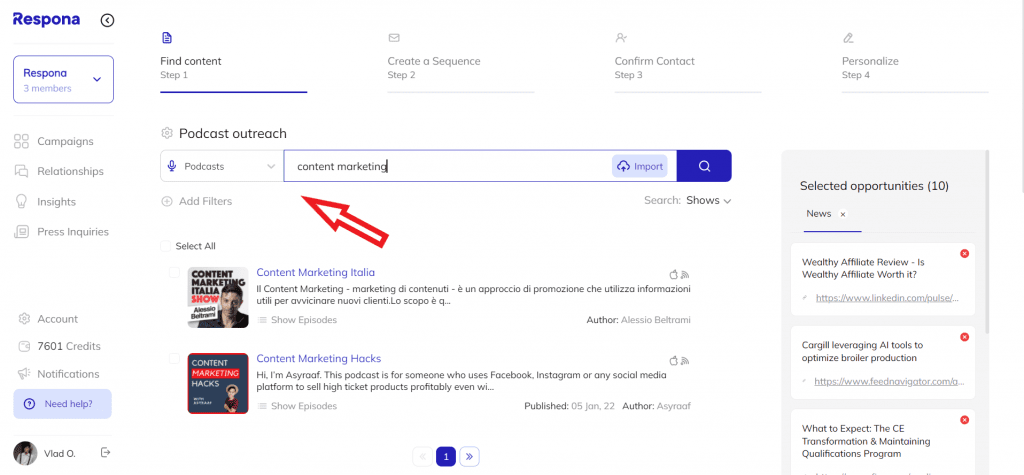
In terms of our scenario, we’re changing the “Source” from the dropdown menu that can be found at the left of the search bar.
The reason why we’re doing this is because we’re interested only in podcasts.
What we’re going to choose is “Podcasts”.
Next, we can set a freshness for our results.
We’re doing this because we want to make sure that the results we’ll get back from Respona are all from recent podcasts that have mentioned the term “content marketing”.
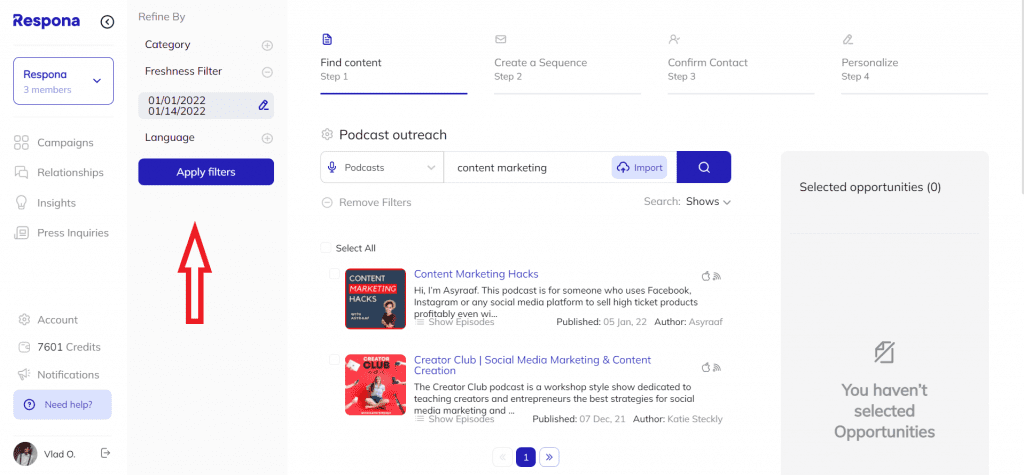
Since we’re looking for podcasts, we can’t really tweak many of the filters above, apart from the “Freshness” one.
When doing a web search or when you’re looking for blogs, you can adjust those parameters to get even more targeted results within Respona.
After making adjustments to the search parameters, Respona will return the results that are relevant.
You can then go on reviewing the search results.
As you can see from the screenshot below, most of the results are really relevant to what we’re looking for.
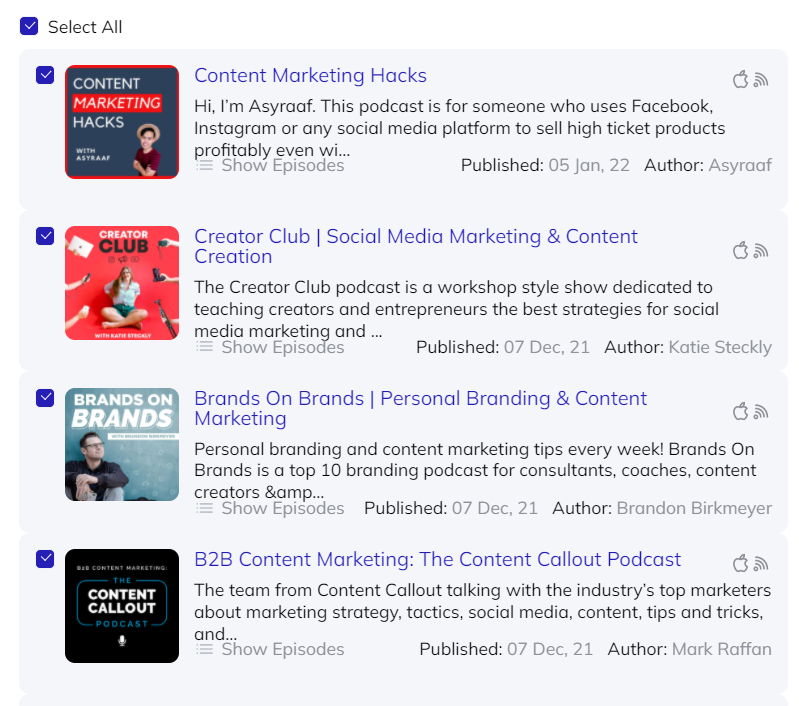
You can investigate the results to find out which ones are the most promising and relevant to your search.
Here’s a great example:
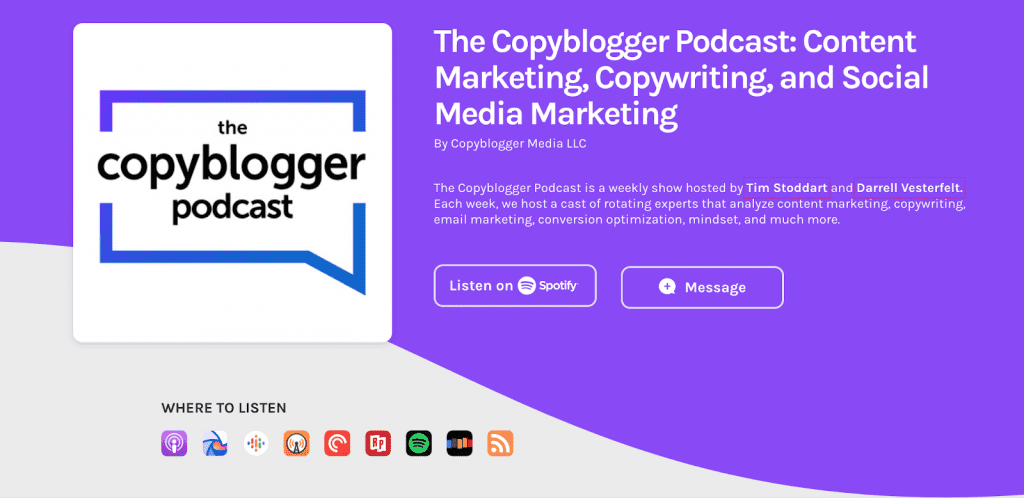
Copyblogger is a very popular blog that talks about content marketing, copywriting, and social media marketing.
The copyblogger podcast is a fantastic podcast about the same topics.
This search result definitely matches our query and it would be a great target for us to reach out to.
After examining the search results based on the criteria of your query, you can choose the results you find to be the best fits for your campaign.
For the purposes of our example, we’ve selected 30 opportunities.
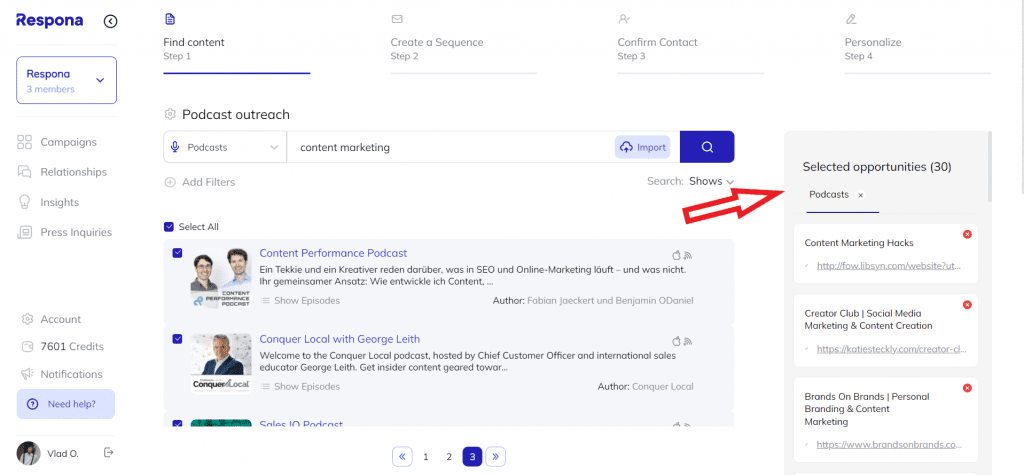
Author’s Note: Even though we’ve chosen 30 opportunities, you can actually go on and use as many opportunities as you like. Generally speaking, the more opportunities, the better.
Within Respona, you can also flip the search from “Shows” to “Episodes” and look up a competitor company or competing company CEO.
This will return results that contain the name (or search term) that you’ve inserted.
For example, here’s how results using my own name look like.
First, insert the term you wish Respona to search for and click on “Shows”.
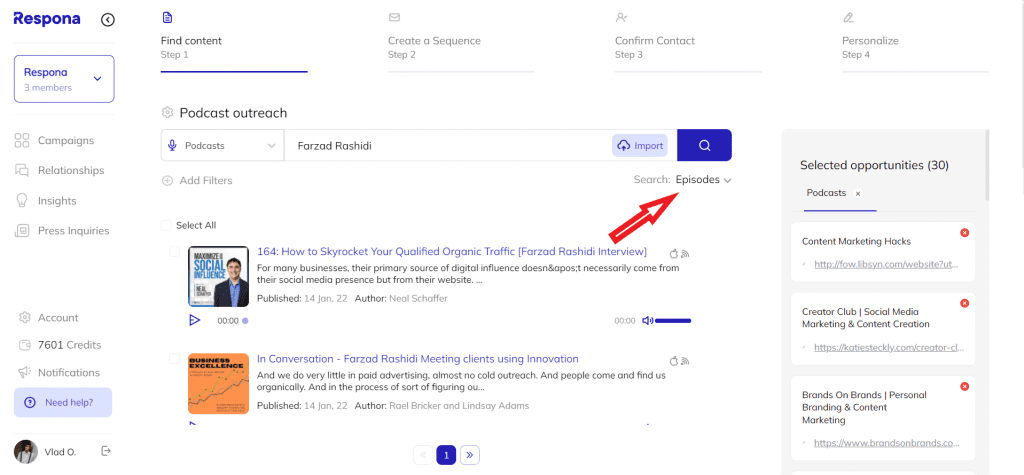
Then, choose “Episodes” as shown above.
From there, Respona shows us the podcasts episodes that include my name in them.
For example, a while back I gave an interview to Neal Schaffer and his “Maximize Your Social Influence Podcast”.
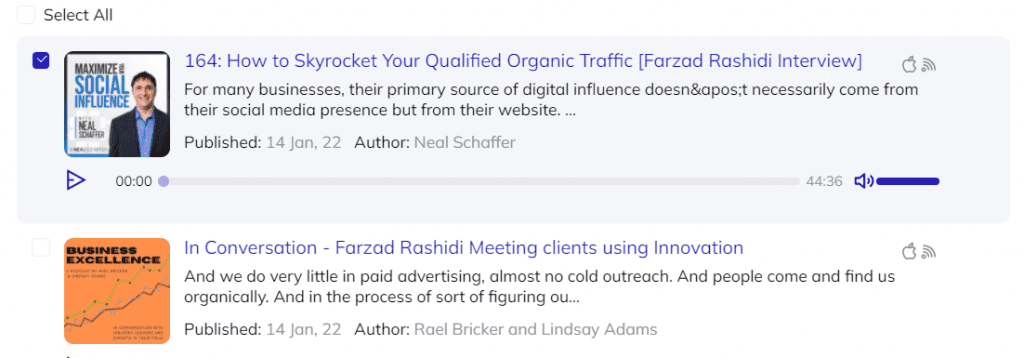
This means that the results provided by Respona in the right direction.
If you think about it, knowing the podcast and specific episodes your competitors are guests on can help you a lot in the prospecting process.
Podcast marketing (through email outreach) isn’t just about finding the best podcast—it’s also about finding the most relevant one.
Let’s get back to our process and see how we’ll find the contact information of our selected podcasts.
After having selected the opportunities you’re going to be working with, you can move to the next step by clicking the ‘Step 2’ button that’s highlighted right below:

Make sure to check the number of opportunities you’re going to reach out to — it has to match the actual number of opportunities you’ve selected.
After selecting your opportunities, you can move on to the next step of the process, where you’ll prepare your email pitch.
Step #2: Prepare your email pitch
The second step is to prepare your email pitch.
Respona offers a wide range of outreach email templates that’ll help you tailor your outreach email sequence.
Within Respona, you can either create your own email pitch, or choose one of Respona’s pre-made templates.
In our example, we’re going to choose the template that Respona has specifically for Podcasts.
After having selected the template, you can give your email sequence a name that you can easily identify afterwards or use it for a future campaign that might be similar.
Here’s what a Respona podcast outreach template looks like.
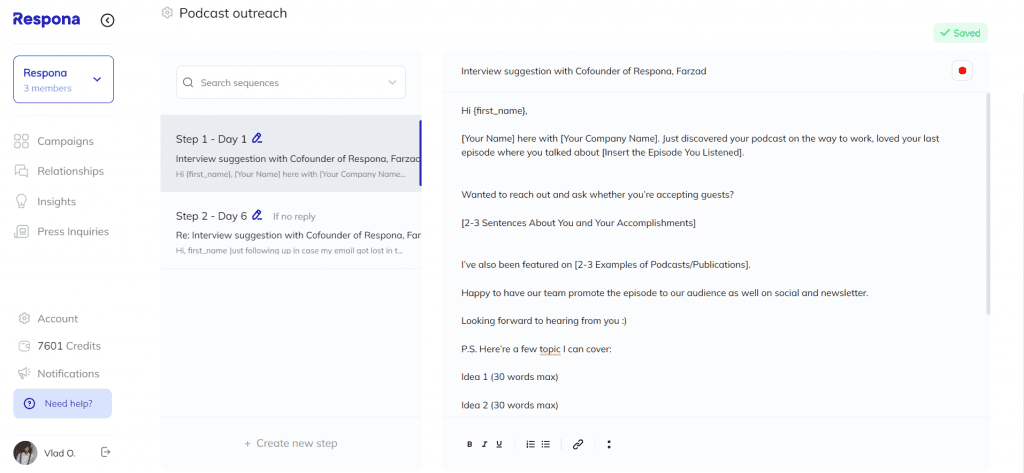
Author’s Note: The parts that are highlighted in yellow are pieces of text you have to replace with personalized information and the pieces of text in {} are called variables — they change automatically based on the contact information of each of the prospects in your list.
As you can see, the template includes an engaging email intro and some variables, in brackets, that will be filled out automatically in the next step.
Here’s the full email:
Subject: Subject
Hi {first_name},
[Your Name] here with [Your Company Name]. Just discovered your podcast on the way to work, loved your last episode where you talked about [Insert the Episode You Listened].
Wanted to reach out and ask whether you’re accepting guests?
[2-3 Sentences About You and Your Accomplishments]
I’ve also been featured on [2-3 Examples of Podcasts/Publications].
Happy to have our team promote the episode to our audience as well on social and newsletter.
Looking forward to hearing from you :)
P.S. Here’re a few topic I can cover:
Idea 1 (30 words max)
Idea 2 (30 words max)
Idea 3 (30 words max)
The important thing is to both highlight why you’d be a great fit to be interviewed by the podcasters you’re reaching out to as well as show them what’s in it for them.
Respona also gives you information about the chances that your email has in terms of getting a reply.
As you can see, the email gets a pretty good score according to Respona’s internal grading system.

This has to do with the word count of the email, the subject line length, with the fact that it includes only one spam word in it, and also it includes a question.
Variables are also very important.
When using the tool and preparing your email, you’ll also have the opportunity to insert additional variables in your email, exactly as shown on the screenshot below:
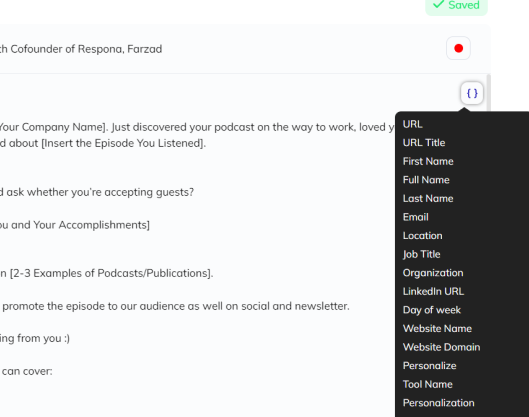
After making all the necessary adjustments and you feel confident about the content of your email, you go on saving your outreach email by clicking on the ‘Save’ button we’ve highlighted for you.
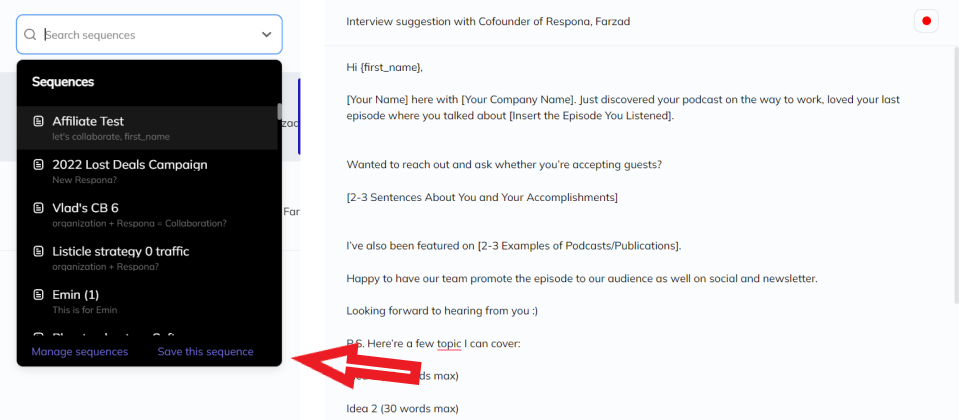
Your email will be saved as the first step in the email sequence.
Given that a big percentage of outreach emails out there go unnoticed, having prepared a follow-up email in case you don’t get a response, is actually necessary.
You can create your email and automate the process of following up, thus saving valuable time and making the whole process less time consuming and stressful.
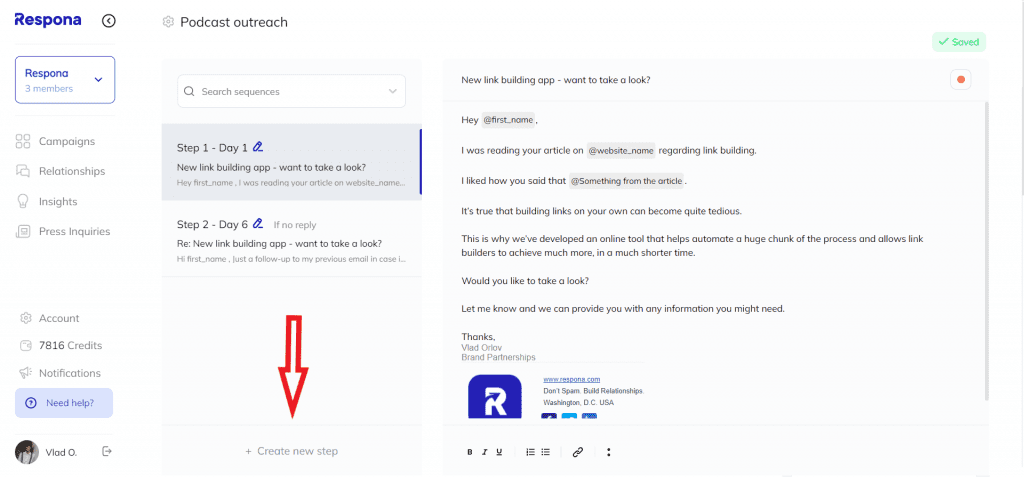
Finally, when you finalize your follow-up email and save it, you’ll be able to see two elements in your email sequence.
Your initial outreach email and your follow-up email.
When you’re done creating your email sequence, you can press on the ‘Step 3’ button and keep working on your podcast marketing campaign.
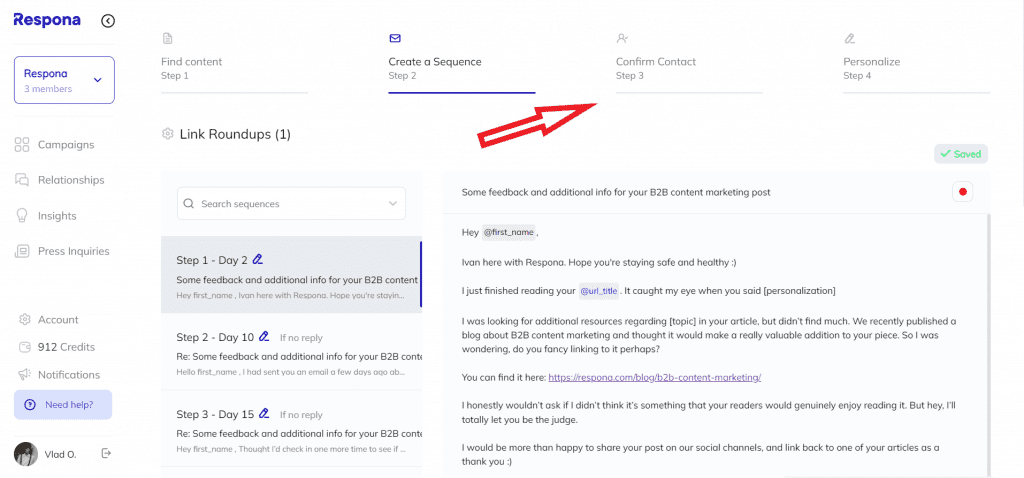
Let’s now move on to the third step we have for you.
Step #3: Finding contact information for your prospects
The third step in creating your campaign with Respona is to find contact information for your prospects.
In other words, in this section you’re going to confirm the contacts Respona has found.
In the case of using Respona for podcast marketing, the tool will get you the best and most relevant contacts for your purposes.
Let’s break down the process.
As you can see in the highlighted area, Respona has given us 27 contacts out of the 30 opportunities we had identified earlier.
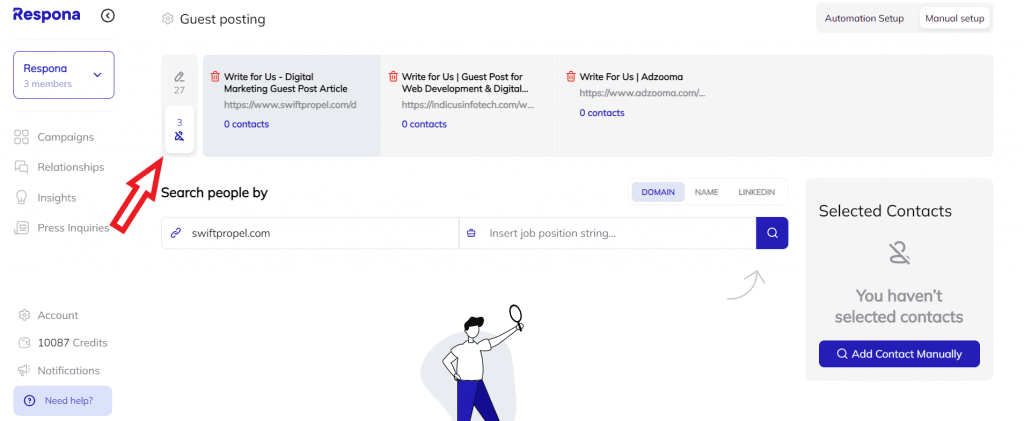
Out of the opportunities that our tool managed to get us contacts for, we’re getting all the contact information we might need for the best fits in terms of prospects.
In other words, we’re getting information about the contact person we should reach out to via Respona.
Have a look:
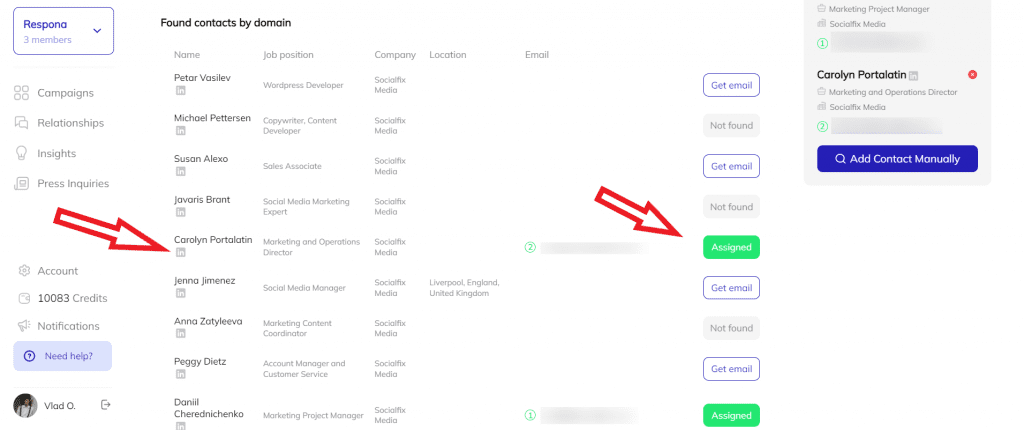
This opportunity includes one contact – some others might have multiple contacts – and has been assigned with a specific contact as you can see above.
After having confirmed the contacts you’re going to reach out to, you can press the ‘Next Step’ button and come one step closer to launching your campaign.

Moving on to the final step we have for you.
Step #4: Launch your outreach campaign and manage communications
Your last step will be to launch your outreach campaign and manage communications.
At this point, you’ll have to make any final adjustments, if any, and personalize your email even further.
Part of doing your adjustments would also include confirming that the variables have been completed correctly.
Here’s how your email should look like at the end:
Hi Benjamin,
Farzad here with Respona. Just discovered your podcast on the way to work—loved the last episode where you talked about the benefits of blogging.
Wanted to reach out and ask whether you’re accepting guests?
I’m the Co-Founder of Respona—an all-in-one digital PR and link building software that combines personalization with productivity.
I also run the marketing efforts at Visme, where I helped the company gain over 7 million users worldwide and pass 1.5M in monthly organic traffic.
Since then, I’ve helped companies achieve the same success via Respona.
I’ve also been featured on several podcasts, such as the Maximize Your Social Influence by Neal Schaffer.
Happy to have our team promote the episode to our audience as well as on social media and newsletter.
Looking forward to hearing from you. :)
P.S. Here’s a few topics I can cover:
- How email outreach can help you transform your expand your network and establish relationships
- The importance of link building when it comes to increasing your organic visibility and organic traffic
- Why improving your domain authority matters when it comes to becoming more competitive on the SERPs (and how email outreach can help you achieve it)
After having completed this step, the opportunities that have been assigned will either be tagged as personalized or not personalized.
After finalizing your email, launching your campaign is the last thing you need to do.
You can do so simply by pressing on the ‘Launch Campaign’ button.
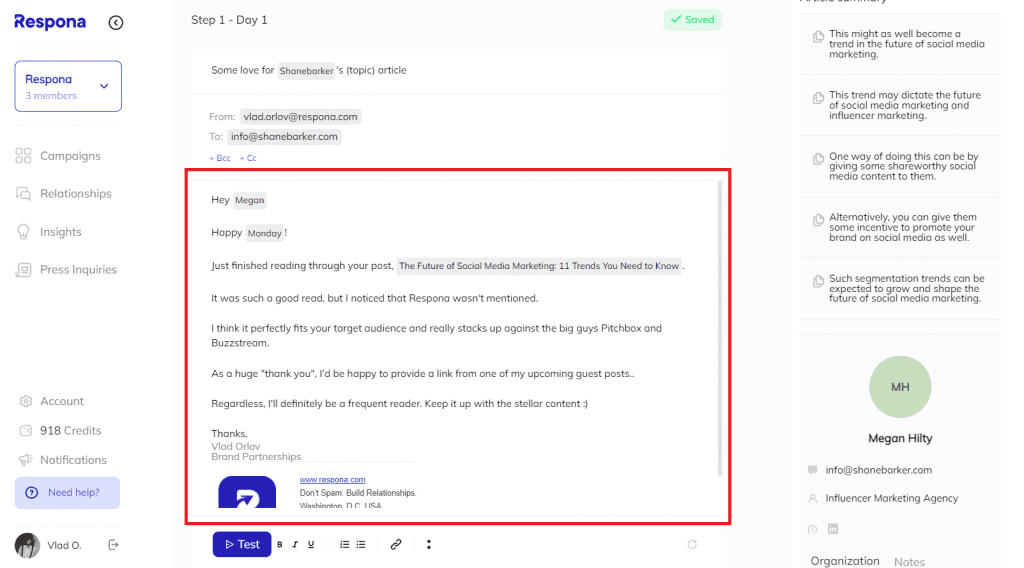
You’ll then have access to all your communications and you’ll of course be able to manage them through Respona and make sure that the whole process runs as it should.
Let’s close this guide up with some final thoughts.
Link building cheat sheet
Wrapping Up
There you have it.
You now know what are the best ways to promote your new podcast.
Rest assured that this is a never-ending process.
Promoting your podcast isn’t a campaign — it’s something you should be doing constantly.
However, the outcomes of a podcast becoming popular are really big.
Simply put, stay on track with what we’ve covered and you’ll do just fine.
![Podcast Marketing: How to Promote a Podcast In 2024 [Guide]](https://respona.com/wp-content/uploads/PODCAST-1024x575.jpg)





